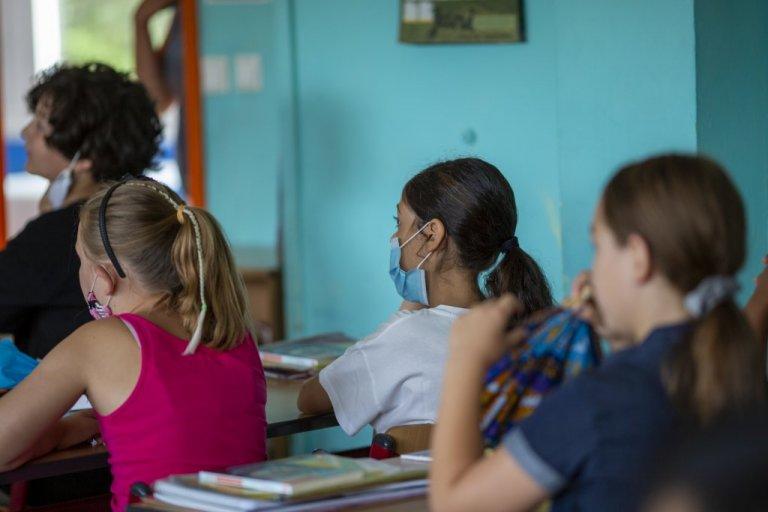
Caption
The state school board rejected Superintendent Richard Wood's plan to reduce the stakes of high-stakes testing this school year. The decision isn't final. / Georgia Recorder
Credit: Maja Hitij

The state school board rejected Superintendent Richard Wood's plan to reduce the stakes of high-stakes testing this school year. The decision isn't final. / Georgia Recorder
Georgia’s state school board Thursday rejected a proposal to make high-stakes standardized tests essentially meaningless for public school students this year after the state superintendent pushed to shrink the effect from 20% to near zero.
The state school board voted 9-3 Thursday to reduce the weight of the tests like Georgia Milestones on some students’ final grade to 10%, rejecting the call by State Superintendent Richard Woods to drop its effect to .01%. State law now says the test should count for 20% of the final grade for some high school classes.
The change must be posted for public comment for 30 days with the board set to take a final vote next month. The board’s next meeting is scheduled for Nov. 19. Students in schools that offer block scheduling will be finishing classes where the tests factor into their grades by the end of December.
In addition to Woods, many teachers, parents and students hoped to avoid the high-stakes, end-of-year tests as the uncertainty of a pandemic continues to upend the usual order of the school year.
“While I respect each member of the State Board of Education, I strongly disagree with the majority’s decision in this matter,” Woods said in a statement after the meeting. “Similar to the federal directive to administer standardized tests in the middle of a pandemic, insisting on high-stakes consequences for those tests is unreasonable and insensitive to the realities of the classroom.”
Woods called for the test to count for nearly nothing after U.S. Education Secretary Betsy DeVos said she would not approve states’ waivers to cancel the test this school year. Georgia was one of the first states to apply for and receive a waiver when they were available last spring after Gov. Brian Kemp ordered school buildings shut to prevent the spread of COVID-19.
In June, the board voted unanimously to spend up to $7.5 million to administer the tests. The board then was hoping for a second waiver.
Instead, DeVos said continuing to deny the tests to students would hamper teachers from understanding gaps in students’ knowledge.
On Thursday, the board voted to spend $17.3 million. The state Legislature will need to approve the added funding to continue testing through March, said Deputy Superintendent for Assessment and Accountability Allison Timberlake.
“I take our fiscal responsibility exceptionally seriously, especially in light of the budget cuts,” Timberlake said. “We renegotiated all of our contracts, we made every change and modification we could to reduce costs, to get our testing burden as low as possible, so despite the millions of dollars associated with this item, every penny is necessary for us to fulfill our state and federal testing obligations.”
State lawmakers cut nearly $1 billion from this year’s public school budget, but education spending still accounts for about half of the state’s $25.9 billion spending plan.
Not all of Woods’ plan for this school year’s testing requires board approval. He recently decided that schools should not use students’ performance on the tests to determine if they move to the next grade and offered increased flexibility in the timing and selection of tests.
Requiring students take the test with the normal stakes would not be fair as many of them are struggling to learn during the ongoing pandemic, he said. And the testing data won’t be as useful as in past years, Woods said.
“This information we get is not going to be any good,” Woods said. “You can look at it, but how are you going to disaggregate it, pull it out? You don’t have the ability to do that. I don’t know how many ways we’re going to look at, try to pull out, ‘How many kids were in school x amount of days, how many schools were not in x amount of days, how many schools started fully online and then began to roll out?”
Test scores should not factor into whether a student advances to the next year or count against a teacher’s evaluations this year, said board member Mike Royal, but reducing their importance to nothing would undo a lot of hard work from educators.
“I’m not ready to give up on this year, I’m not ready to give up on this semester,” he said. “They are teaching and learning, and what about the districts that busted their butt all summer planning, preparing to get these kids back to school and have done a fantastic job, who wants that data?”
Making the test functionally optional would also disproportionately harm children in poverty or in other challenging situations, he said.
The data would likely not be comparable to other years’ metrics, board member Trey Allen said, but a snapshot of how students performed could still be illustrative. And forcing children into taking a test that does not count for anything would send the wrong message.
“What is that teaching our children?” he said. “What are we telling our kids? We’re going to pull you out of class for two days, we’re going to make you go through this expensive, troublesome test, but it’s not really counting for anything.”
Woods called for Georgians to share their opinions during the upcoming public comment process in his statement after the meeting.
“I am confident our high-school students whose GPAs and scholarships are riding on this decision would agree that a 10% weight is still high-stakes,” Woods said. “I encourage all Georgians, whether they agree or disagree with my view, to provide their feedback through the public-comment process and let their voice be heard.”
This story comes to GPB through a reporting partnership with Georgia Recorder.